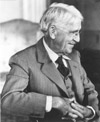|
John Dewey.
Photograph by Sylvia Salmi, 1950.
By permission, Bettman-CORBIS
|
List of Contents
The Correspondence of John Dewey, 1871-2007 (I-IV) is a
comprehensive electronic edition of letters to, from, and about John
Dewey. Larry Hickman, Director of the Center for Dewey Studies at
Southern Illinois University, Carbondale, is the electronic
editor.
- Vol. I: 1871-1918
- Letters of Dewey's family and the family of his
first wife, Alice Chipman
- Dewey's graduate school years and his years at
the University of Michigan and the University of Minnesota
- His marriage and family life
- His decade at the University of Chicago and the
founding of the "Dewey School"
- His move to Columbia University
- His role as a founder of the American
Association of University Professors and his political activities
during World War One
- Vol. II: 1919-1939
- Correspondence pertaining to Dewey's lectures in
Japan and China
- His visits to Turkey, Mexico, and the Soviet Union
- The death of his wife Alice
- His first retirement from Columbia University
- His activism during the Great Depression
- His role as chair of the Trotsky inquiry
- His second retirement from Columbia University
- Vol. III: 1940-1953
- Correspondence pertaining to his defense of
academic freedom during World War Two and the Cold War
- His defense of Bertrand Russell
- His second marriage to Roberta Lowitz Grant
- His ninetieth birthday celebration
- His death in 1952 and the correspondence that
followed
- Vol. IV: 1953-2007
- Correspondence pertaining to the disposition of
Dewey's literary estate
- The role of Dewey's second wife, Roberta, and
her death in 1970
- The John Dewey Foundation and the role of
Foundation President Sidney Hook and others in the disposition of
Dewey's papers and effects
- The events that led to the publication of the 37
volumes of the Collected Works
- Competition for the Dewey Papers and their
acquisition by Southern Illinois University
- An interview with Collected Works editor
Dr. Jo Ann Boydston
|
The many sides of Dewey are displayed: philosopher, organizer, public intellectual and family man. Hickman’s extensive "Overview" is invaluable. Supplementary letters enrich the compilation: i.e., William James to F. C. S. Schiller ("Dewey is hard to understand.") . . . it is hard to imagine another way of examining a collected correspondence.
—Drew Christie
University of New Hampshire
U.S.A.
The publication of John Dewey's correspondence is a landmark event for American philosophy. Reading a long stretch of letters in their chronological order is addictive and enlightening! This treasure of many thousands of letters, including hundreds from Dewey's friends, colleagues, and acquaintances, are an essential resource for studying an important era in America's intellectual life. From the arcane to the profound -- and even the humorous -- these letters provide a rare opportunity to gain insights into Dewey's life and thought, his contributions to his profession and the many political causes he championed, and his central role in democracy's progress.
—Prof. John Shook
Department of Philosophy
Oklahoma State University
U.S.A.
|



